Entry 429 — Some Grumman Logic
The sentence below this one is false.
The sentence above this one is true.
What can we now say about the two sentences above? That, if we dispense with the false true/false dichotomy, neither is either true or false: each is true/false or paradoxical. Parodoxes are inevitable in any human language, which in my thinking includes the language of mathematics and all the sciences. It seems to me they never occur in nature. That is, nothing in reality except our attempts to describe is ever paradoxical. Hence, two parallel lines can meet each other in Non-Euclidean geometry, but not in the real world.
An aside: I’ve always wondered at the fact that many intelligent people with scientific backgrounds find the idea that parallel lines that meet will exist if the universe were the surface of a sphere. Only in geometry. In the real world nothing that has less spatial dimensions than two can exist. Start drawing a line on your universe as the surface of a sphere and your first tiny dot with burst out if it on both sides.
Related to this absurdity is the idea of curved space. But that’s just an absurdity of expression–saying, for instance, that a curving ray of light curves due to the effect on space of gravity rather than due to the effect of gravity on it.
It applies, too, to the idea of transfinite numbers. The idea behind that, according to George Gamow is that you can’t form a list of infinitely-repeating decimal fractions that contains them all as shown by the fact (and this is true) that if someone brings up a fraction he claims is not on your list, giving you the first ten digits, say, and you show him it is on your list, he can show it isn’t by showing you the eleventh digit on his is different the eleventh digit on yours, or–in the one in ten chance thatthe digits match, that some other later digit on his fraction is different from the one in that spot on yours.
But that procedure can work oppositely: you can make a list of all possible decimal fractions including infinitely-repeating ones and challenge him to find an infinitely-repeating decimal fraction of a given length that’s not on your list. If you take all the integers in order, reversed, and make them infinitely-repeating decimal fractions by putting a point in front of each one as here:
.1 .2 . . . .9 .01 .11 .21 . . . .91 .02 . . . .99 .001 . . .
he will not be able to give you any decimal that you can’t immediately indicate the location of on your list of a decimal fraction matching whatever string of digits he gives you. Say it’s 00958746537 . . . That will be the 73564785900th number on your list. He can’t then say his number’s twelfth digit is different from your number’s because you can honestly say you don’t know what your number’s twelfth digit is. But that his second number can be as easily found as his first.
So you have two true statements about mathematics that contradict each other. I say they are therefore true/false statements, or paradoxes.
I don’t believe any real object can be infinite. Space may be said to be, but it doesn’t exist, in my philosophy. But I doubt that there’s any way of testing the truth of what is just my opinion.
Note to anyone concerned about my health: I managed to get through a stress test yesterday without having a heart attack or stroke. I’m now wearing a heart monitor that will come off in three hours, at ten a.m. I felt peculiar a few times while wearing it. I hope they don’t turn up as problems on the monitor’s record.
I had trouble walking properly on the stress test treadmill. My doctor and the woman overseeing me got quite frustrated. I felt incredibly stupid. I think I know what happened: there are rails to hold onto that I couldn’t grip without slightly stooping because I’m tall but have the arm-length of a 5′ 9″ white man, so I felt very awkward–until I just let my fingers touch the rails. I also tried too hard because I thought I was going to be tested with stress. When it was over, I asked why they’d never speeded it up. No stress at all except the stress of feeling physically incompetent.
Hmmm, my spell-checker doesn’t like “speeded up.” But surely “sped up” is not correct. Weird. I’d automatically say, “I sped home,” not “I speeded home.” But that’s great. The language should be crazy–as long as it tries for maximal stability.
I have opined on occasion that people who can remember rules of usage like sped/speeded may be use them to show their superiority to those who can’t–in other words, the lay/lie distinction that I hold to, for example, I hold to partly to show I’m not low-class. But I hope my main reason is that I like ways to break out of universal rules as a literary artist. I do believe in social classes, though. It slightly simplifies relating to people, which is incredibly complex. Not that my believing in it matters since a classless society is impossible.
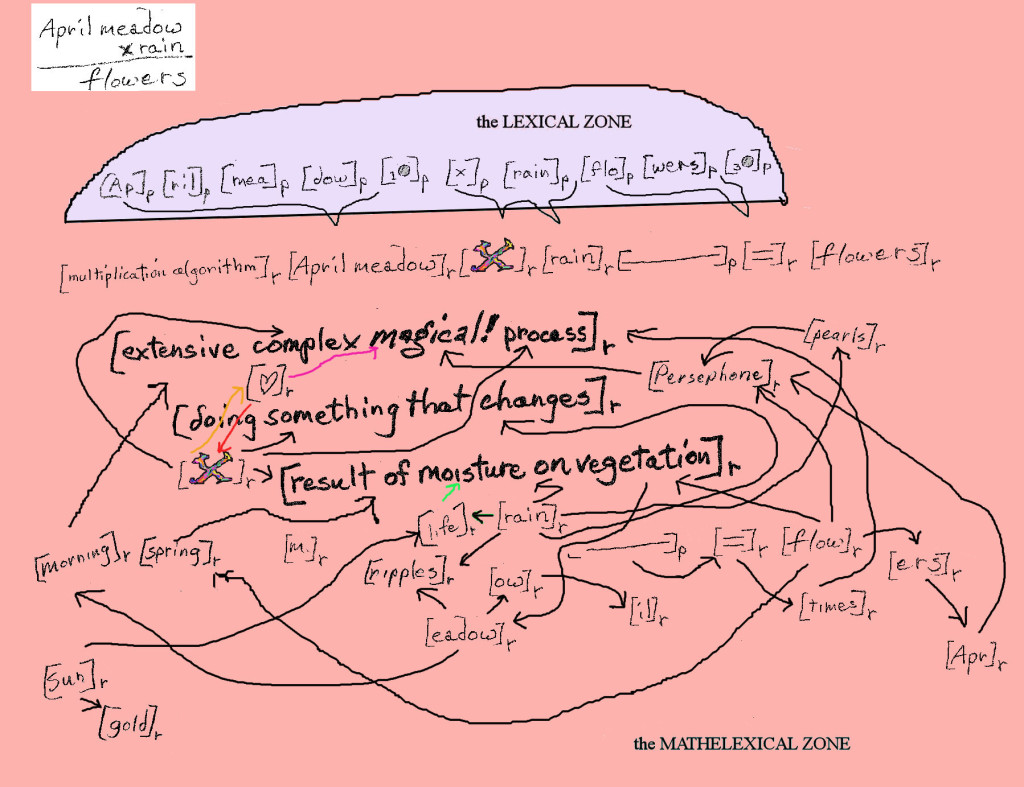
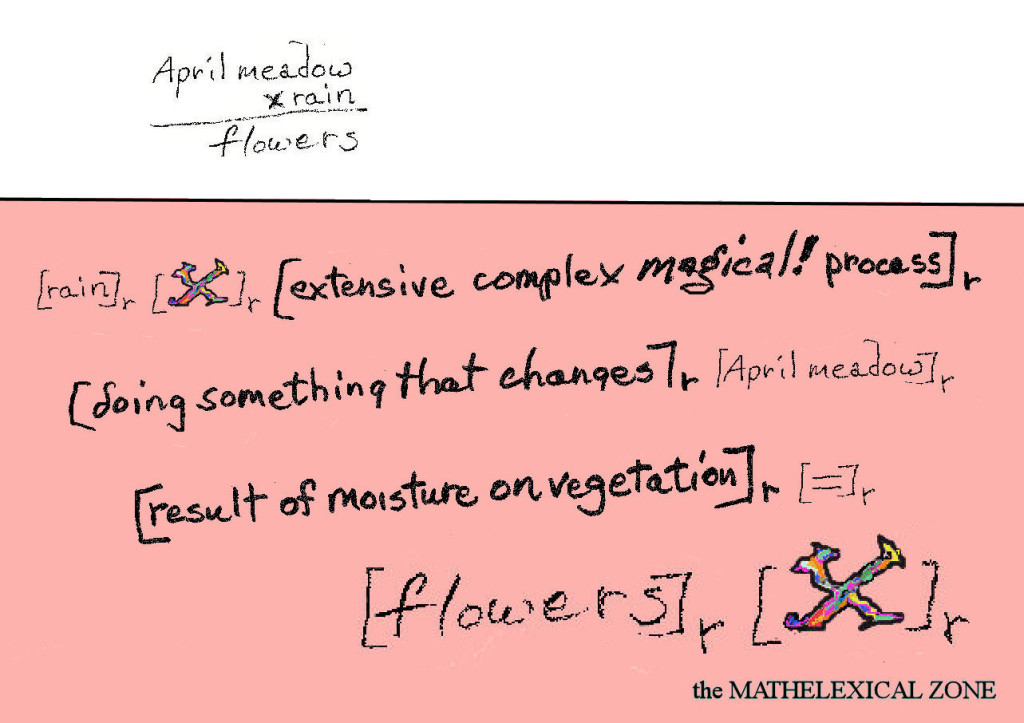
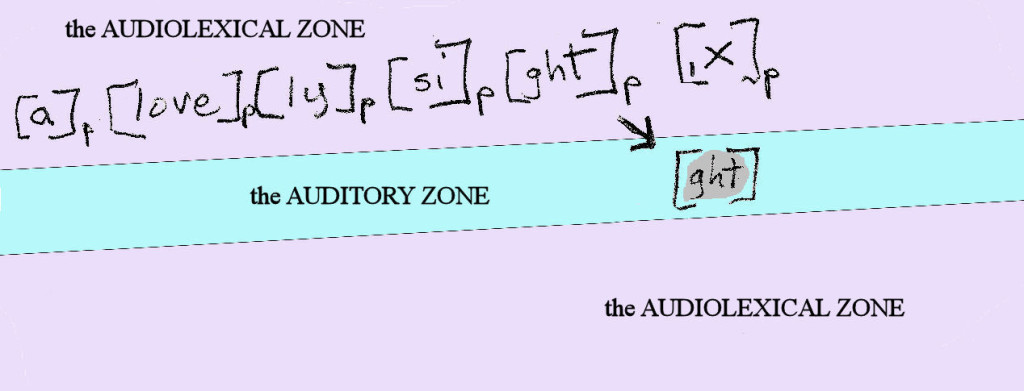
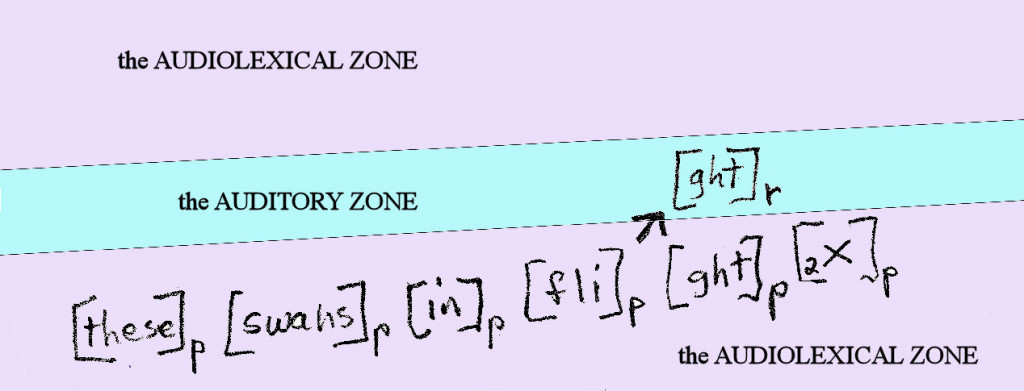
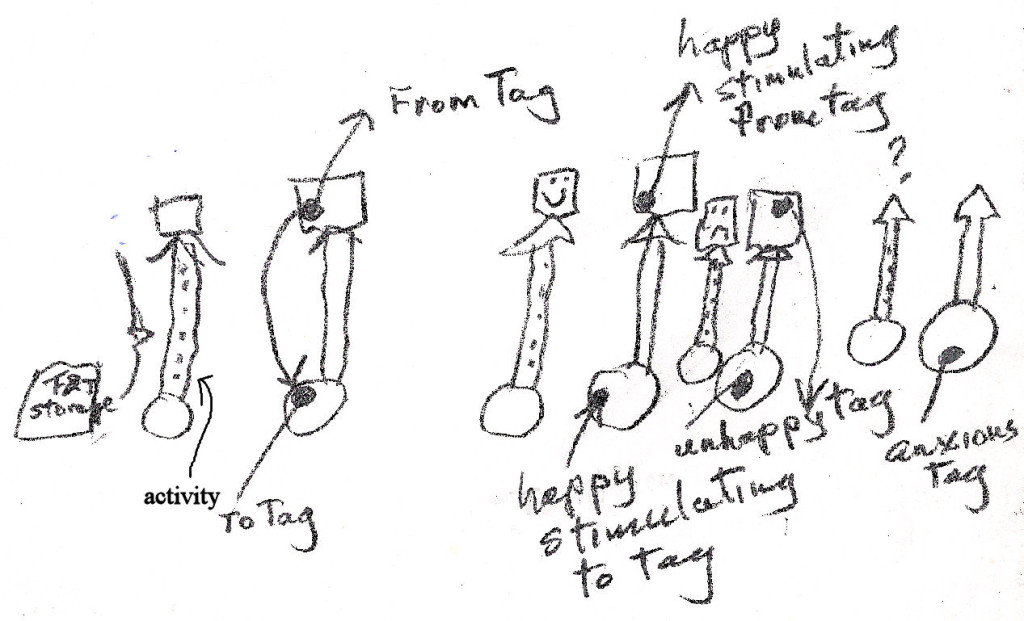
Bob,
I don’t think your transfinite number statements make sense. Basically, you can show that the infinite number of fractions is equal to the infinite number of integers is equal to the infinite number of positive whole numbers, by showing a way to map them all. But you can also show that the (infinite) number of real numbers is greater than the infinite number of integers.
the way to show that that the number of fractions (or rational numbers) is to find a way to list them so that you can count them all, so that then given a fraction you can figure out what number it is on your list of fractions. Since all fractions are written as ratios of numbers, you can write them like this:
1/1 1/2 1/3 1/4 1/5 . . . .
2/1 2/2 2/3 2/4 2/5 . . . . .
3/1 3/2 3/3 3/4 3/5 . . . . .
4/1 4/2 4/3 4/4 4/5 . . .
5/1 5/2 5/3 5/4 5/5 . . .
Then you can count by starting with at the corner with 1/1 and then moving around to 1/2, 2/1, 1/3, 2/2, 3/1, 1/4, 2/3, 3/2, 4/1, and so on. Now you are counting them in a pyramid, and you can label the rows of the pyramid by the sum of the numerator and denominator, so the first pyramid row consists of 1/1, which we label row 2 because 1+1=2. Then there’s row 3 with two members 1/2 and 2/1, and for each 1+2=2+1=3. The next row is 4 with 3 members, and 1+3=2+2=3+1=4. Now if you give me any (positive) fraction a/b, i can compute it’s position in my pyramid scheme — it is the a-th term in row (a+b), so it’s number is the Sum of 1+2+3+4+. . . +(a+b-1)+a. In other words I count up the terms in the preceding rows in my pyramid and add a because that’s where it is in the last row of fractions. So there’s a way to count fractions, which means that the total number (that degree of infinity) is the same.
But the number of real numbers is greater, and the proof works this way. Suppose you have some scheme for counting real numbers (we can even limit it to real numbers between 0 and 1, if you like), then take your first number on your list and write it as a decimal. If the decimal repeats, fine. If it ends, you can always add 0s on the end, after all 0.25=0.250=0.25000=0.25000000000000000000, etc.
Then i can take your list and generate a new decimal number that isn’t on your list. Suppose the first number starts 0.1, so i pick a different digit than 1, say 2,and start my new number as 0.2. If your next number starts 0.037763902, then i look at the second digit, 3, and pick a different digit, say 2, and so my number 0.22 . . . isn’t the second one on your list either. For the third digit, i look at the third digit of your third number and pick something different (I have 9 choices), for the fourth digit i look at the fourth digit of your fourth number and pick something different there. If you would prefer an algorithm to pick each digit, you can always add 1 cyclically, so that if the nth digit of your nth number is 9, i pick 0 for my nth digit. So thus you see that for any counting scheme you have for real numbers, i can make a number that isn’t on your list.
You can also show that the infinite number of points (real numbers) between 0 and 1 is equal to the number of points greater than one, because you can draw a one-to-one correspondence between x and 1/x.
Infinite numbers are pretty crazy, but there are actually rigorous ways of working with them.
– endwar
Cantor wants a list of decimal fractions you can count. I don’t. I just want a list that every decimal fraction will eventually show up on, and I have it. The fact that when I find some decimal fraction asked for on my list, a second decimal fraction can be named of greater length that may not be the number I’ve just found on my list is lrrelevant. Bringing in non-repeating decimals is just a con game like bringing in lies and non-lies into linguistics to produce paradoxes. I’m sure transfinite numbers are fun for mathematicians but also sure they are inapplicable to anything in the real world. According to my philosophy. (And my neurophysiology, which holds that numbers are real secondary characteristics of real things, and that–possibly–addition and subtration and may be further processes are real the way motion is. I’m working on an attempt coherently to show how this is that may take me a while because it’s currently low on my list of priorities.)